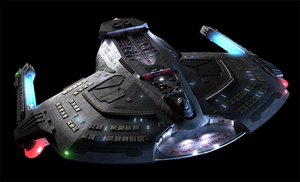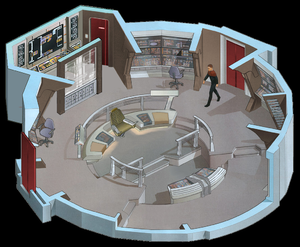| Pereh (STX-120) | ||||||||||||||||

| ||||||||||||||||
| Pereh (STX-120) | ||||||||||||||||
| ||||||||||||||||
The Pereh (Hebrew: פרא: Onager) missile carrier is a prototype warp-capable mobile weapons platform carrying 12 high-yield ALR-X cruise missiles. It is primarily designed as a support vessel, using long-range precision-guided munitions to destroy large, dangerous targets from behind the protection of ships-of-the-line or striking designated targets from beyond sensor range.
Design
The Pereh consists of a fire control module with accompanying gunnery rooms, along with a fully modular weapons platform allowing addition and removal of reloadable missile launch cells. The missile cells of choice for the Pereh are 12 sensor-proofed Type 2A Armored Box Launcher tubes, derived from the smaller, older spatial charge cruise missile cells fitted onto the USS Bonhomme Richard. Key changes in the 2A variant from the base 2 include an additional layer of ablative armor, blowout panels to divert explosive force in the event of catastrophic sympathetic detonation, and an automatic cell ejection system that detaches affected cells in the event of imminent detonation. The launcher unit is capable of rising out of the hull and angling itself upwards, with the missiles themselves being off-boresight-capable out to 270-degrees so that the launcher itself does not have to rotate.
In order to mask it's classified identity, the first Pereh-class mobile weapons platform had a mock Saber-class hull built around the vessel, fit with a functional warp drive in addition to the standard high-performance impulse engines. Despite common misconception, the Pereh is not a refitted Saber-class ship, instead, it's an imposter wearing a clever disguise. Solas Tempus engineers went as far as including a tuneable IFF transponder system, with presets to mimic several existing Starfleet Saber identification codes. The ship's hull is painted in regular Starfleet livery and bears the "name" USS Yeager (NCC-61947). On top of the missile cells, which occupies most of the "saucer" section, is a large mock hull plate, with a faux mission pod, phaser arrays, and escape pods, to make distinguishing the ship visually more difficult. This is not easily accomplished, however, as gaps around the missile launcher are visible up close, as well as plasma exhaust vents in each cell and a slightly higher profile of 50.10 meters vs. 48.60.
Internally, the ship is designed to mimic a regular Saber-class ship, with the exception of the fire control and gunnery rooms. Since the 100-meter-long missile cells occupy most of the saucer, almost all of the scientific, recreational, and crew quarter areas have been removed to clear enough space. Both the warp core and the computer core have been relocated further back to the rear of the ship, while the warp nacelles, bridge, and deflector dish remain the same. Crew capacity is significantly lower than the typical Saber-class vessel, at 30 instead of the standard complement of 90 or higher. To compensate for this, additional decoys can be placed at strategic locations along the ship's interior, giving the impression that the ship is manned by a more reasonable "skeleton crew" for an average Saber-class ship.
The Pereh's main armament consists of 12 Mark X Block IIIA LRAM cruise missiles, which are upgrades of the original ALR-X missiles. Each one features a wider variety of seekers, including infrared, semi-active sensor, encrypted subspace signal, and active-sensor guidance. Firing mode can be selected by the fire control officer, and can be alternated while the missile is en-route to the target. Most notable of these modes is the semi-active sensor function, which allows any vessel, station, or probe with a universal encrypted datalink to relay targeting sensor information to the missile outside of it's standard active guidance, thus extending the overall range and accuracy of the weapon. To accommodate this new feature in Block IIIA missiles, the forward torpedo launcher has been removed in favor of a powerful scanner array, along with the necessary upgrades to facilitate the operation of such an aperture. This allows the ship to detect, assess, and engage threats at ranges far outside those of contemporary starships.
The 3 phaser arrays on the regular Saber hull have been replaced with mock reinforced polymer arrays due to the lack of space and power to supply the large Type X arrays, with the phaser armament being reduced to 10 Type VIII emitters as seen on Excelsior-class starships. 8 of these are located on the tip of the saucer, with another 2 mounted on the rear above the 2-tube torpedo launcher. These are recessed into the hull and provide reasonable backup firepower for a fire support vessel, while not compromising the disguise.
Defensively, the Pereh features a phasing cloak, energy signature modification system, standard deflector shields, ablative hull armor plating, molecular APS, and tritanium alloy struts. The phasing cloak allows for the ship to get into a contested firing position, or flee the scene once it has released its payload, however it cannot fire ALR-X missiles while phase cloaked. The energy signature modification system is to spoof sensors into thinking it's a standard Saber-class vessel, or if a visual-range confrontation is not expected, something smaller such as a runabout. Standard deflector shields provide protection against incoming projectiles, while ablative armor hull plating increases structural durability.
The SM-e4 Molecular Active Protection System is a prototype defensive system that manipulates magnetic forces to diffuse particles and scramble guidance systems of certain projectiles before they can impact the ship, and was reverse-engineered and upscaled from an example brought back from Sirius. It is not a wholly-effective system, and can be intensely power-hungry, making it a suitable addition to deflector shields but not a full-on replacement.
Tritanium-Iridium struts are another one of the ship's novel defensive systems, derived from that of Sirian armor upgrades that lined the cargo hold with high-strength alloy struts to boost hull integrity. The Pereh system, when mounted in a Saber hull, has a lot of "dead" or "empty" space, which provide little more than added weight. By adding grid networks of high-strength tritanium-iridium struts to these empty spaces, the ship effectively gains structural integrity as well as buffer zones for hull breaches.
General Statistics

- Dimensions
- 190 x 193.19 x 50.10 meters
- Crew Complement
- 30+ (6 Officers, 24 Enlisted, and up to 60 extra decoys)
- Power Source
- Matter/Antimatter Reactor
Fusion Reactors - Propulsion
- Warp Drive
Impulse Drive - Cruising Speed
- Warp 7 / Fold 7.12
- Flank Speed
- Warp 9.7 (For 12 hours)
- War Emergency Speed
- Warp 9.999 / Fold 8.5 (For 1 hour)
- Deck Plans
- Classified
Offensive Systems
- 5 Type VIII Twin Phaser Banks (10 emitters, 8 fore, 2 aft)
- 1 2-tube Torpedo Launcher (Aft)
- 6 2-cell Type 2A Armored Box Launchers
- 12 Mark X Block II, Block III, or Block IV Long Range Autonomous Missiles
Defensive Systems
- Deflector Shields
- Ablative Armor
- Tritanium alloy struts
- SM-e4 Molecular Active Protection System
- Phasing Cloak
- Energy Signature Modification System
Service History
The Pereh is set to complete trials by January 1st, 2384, and will be assigned a captain once it is officially launched as the USS Yeager.